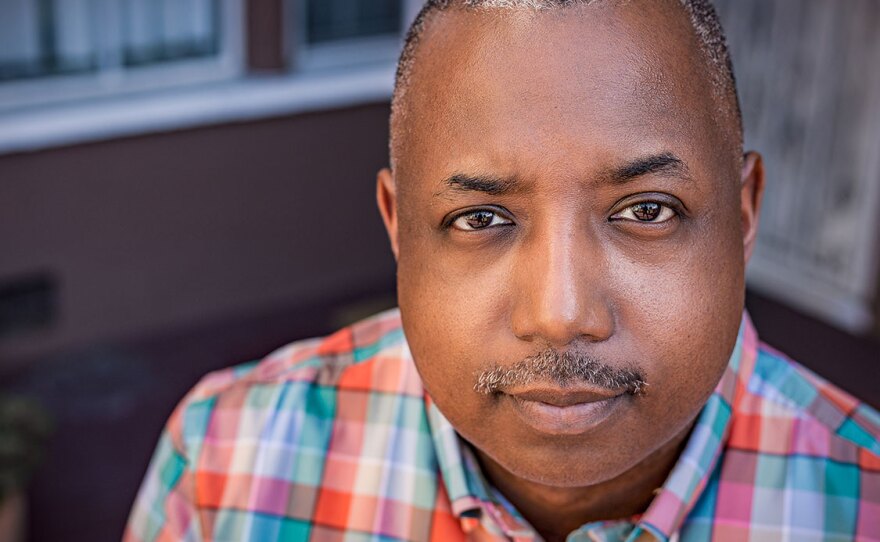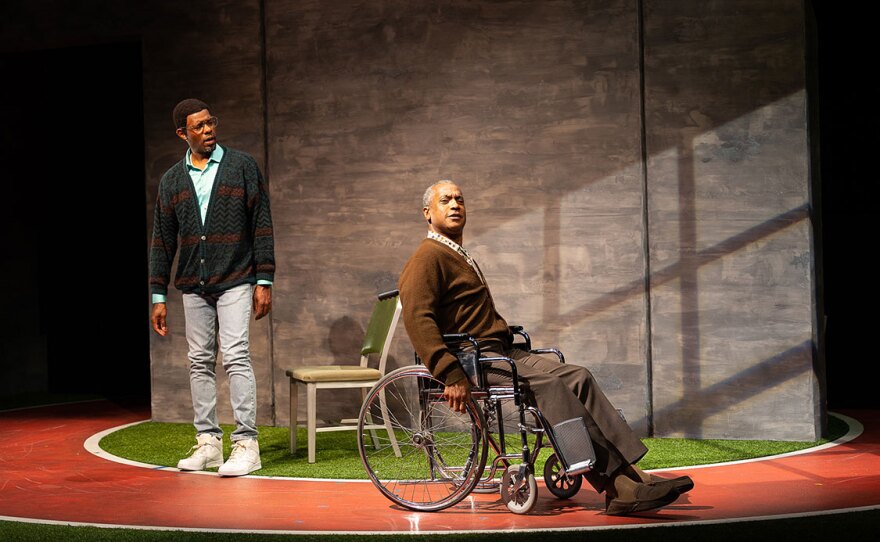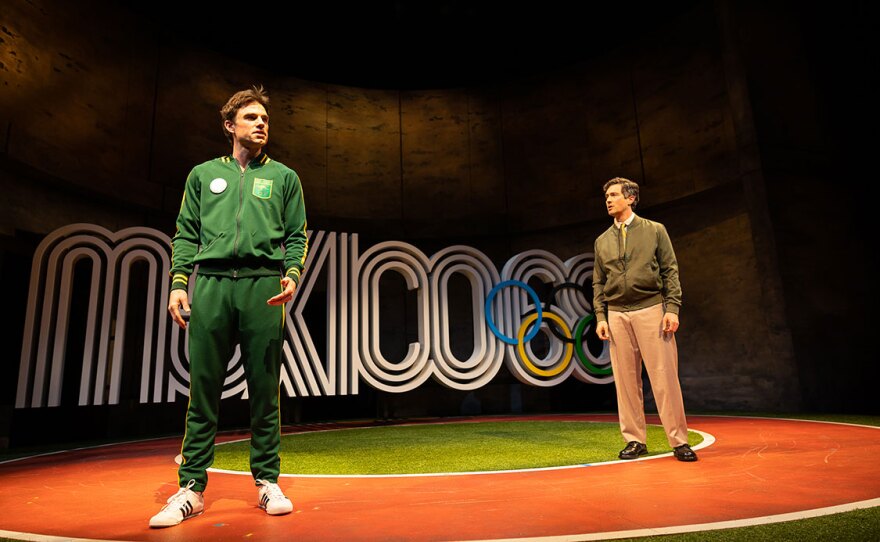Now on stage at The Old Globe is the world premiere of playwright and filmmaker Kemp Powers' "The XIXth" (The Nineteenth), directed by Carl Cofield.
The play is a fictionalized account of the 1968 Summer Olympics, when two Black American sprinters raised their fists as a form of protest on the medal podium as the National Anthem played, protesting racial injustice. Tommie Smith (played by Korey Jackson) and John Carlos (Biko Eisen-Martin) had just won the gold and bronze medals in the 200-meter dash — Smith even got a world record of 19.83 seconds.
The playwright, Kemp Powers, is also a filmmaker known for Pixar's "Soul" as well as co-directing "Spider-Man: Across the Spider-Verse" that's coming this summer and "Beyond the Spider-Verse" next year. One of his earliest plays was "One Night in Miami," about the real-life meeting of Malcolm X, Muhammed Ali, Jim Brown and Sam Cooke — which he then adapted for a movie.

"Whenever there are greater truths and greater lessons to learn from moments in history, those are the types of stories that really draw me in," Powers said. "When I started digging and doing a little bit of research into what went on in the moments leading up to that as well as what happened after that protest, I guess it just got me thinking about what it means to make a heroic gesture, and what the cost can be."
"The XIXth" at The Old Globe
On stage through Apr. 23, 2023.
Showtimes here.
The Old Globe, 1363 Old Globe Way, Balboa Park.
$29+.
The 19th Olympic Games were 55 years ago, and Powers wanted the play to consider how history continues to unfold.
"You think we would have made a certain amount of progress — that we think that kind of thing wouldn't happen today. And then we look at the case of Colin Kaepernick, who hasn't played in the NFL since, I believe, 2017 because of his silent gesture of kneeling before football games," Powers said. "If we don't do something about it, history will repeat itself. I know that's a bit of a cliche, but when it comes to protest and any gains that we make, you have to be vigilant about those gains or else we are always in danger of backsliding and losing any progress that's been made. And sports has changed dramatically in the years since, but I think the rights of athletes — the rights in particular of athletes of color — it still resonates with people because it's still an issue."

Another part of the story Powers explores in the play is allyship. The silver medalist in that 200-meter race was white Australian runner Peter Norman. Though Norman did not raise his fist during the medal ceremony, he wore the "Olympic Project for Human Rights" badge that Smith and Carlos, the Americans, wore. He faced similar ostracization at home and wasn't invited back to the Australian Olympic team.

Despite Powers' success on the big screen, he still knew he wanted to tell this story as a stage play.
"I like to tell stories. I'm a storyteller, and there are different avenues for telling those stories. And the stage is always going to be an important outlet for me to tell a certain kind of story in a way that film and television won't be," Powers said.
"There's something about sitting in — for me at least — the back row because I always sit in the back row when I'm watching my own play on opening night. And I'm as much watching the audience as I am watching what's going on on stage and seeing that interaction, seeing that reaction. I don't know; it sets off some kind of endorphin in me. That makes me very satisfied because I actually see my work connecting with people in real-time."
When asked about Spider-Man, Powers said he learned early on about the "responsibility" he has to the massive fanbase, but ultimately, he came to the story and the character of Miles Morales as a fan.
"The Spider-Man character — both Peter Parker and Miles Morales' Spider-Man — was always one of my favorite superheroes, and I think a lot of it is that we all can see ourselves in Spider-Man. We connect to him a lot more than other iconic superheroes," Powers said. "Batman's Bruce Wayne, he's a billionaire. Superman is an alien from another planet. Spider-Man is just like one of us."
In "Into the Spider-Verse" and the upcoming sequels, the story revolves around Miles Morales, a character introduced to the Spider-Man franchise in the comics in 2011. He's a Black and Puerto Rican teenage boy living in Brooklyn.
Powers said that in directing the film, he's aware of the realities of Miles' experience as a person of color, and he's also interested in his relatability and versatility. He also was drawn to the way Miles' parents are handling his story — something fundamentally driven by Powers' own experience parenting a teenage boy.
"One of the things that excites me so much about this film is that it's a coming-of-age story, but it's a coming-of-age story both for kids and for parents. Because Miles is coming of age, he's going through a transformation. But Miles' parents are also coming of age," Powers said. "They're going through a transformation from having a young child to a young adult, and having lived it with my own kids, I feel like that's universal."
"The XIXth" is on stage at The Old Globe through Apr. 23. Spider-Man: Across the Spider-Verse opens in theaters June 2.
-
KPBS Midday EditionOn Thursday on Midday Edition, weekend preview is back with a conversation with "The XIXth (The Nineteenth)" playwright, Kemp Powers, who is also director of the forthcoming "Spider-Man: Across the Spider-Verse." And, a preview of an exhibit by the De La Torre Brothers currently on view at the Institute of Contemporary Art. Plus, hip-hop artist and comedian Reggie Watts is coming to The Music Box on Saturday.







